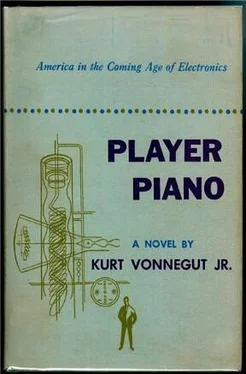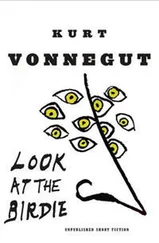"Paul - is this your idea of a joke? Take me home, please. "
"Nobody's going to hurt you. These people are just your fellow Americans."
"Just because they were born in the same part of the world as I was, that doesn't mean I have to come down here and wallow with them."
Paul had expected this reaction, and remained patient in the face of it. Of all the people on the north side of the river, Anita was the only one whose contempt for those in Homestead was laced with active hatred. She was also the only wife on the north side who had never been to college at all. The usual attitude of the Country Club set toward Homesteaders was contempt, all right, but it had an affectionate and amused undertone, the same sort of sentiment felt by most for creatures of the woods and fields. Anita hated Homesteaders.
If Paul were ever moved to be extremely cruel to her, the cruelest thing he could do, he knew, would be to point out to her why she hated as she did: if he hadn't married her, this was where she'd be, what she'd be.
"We're not getting out," said Paul. "We'll just sit here a few minutes and watch. Then we'll move on."
"Watch what?"
"Whatever there is to see. The line painters, the man running the hydrant, the people watching him, the little boy making boats, the old men in the saloon. Just keep looking around. There's plenty to see."
She didn't look around, but slouched down in the seat and stared at her hands.
Paul had an idea what she was thinking - that for some reason she couldn't understand, he was doing this to humiliate her, to recall her humble origins. Had that been what he wanted to do, he would have been completely successful, because her virulent hate had decayed. She'd fallen silent and tried to make herself small.
"You know why I brought you here?"
Her voice was a whisper. "No. But I want to go home, Paul. Please?"
"Anita - I brought us here because I think it's high time we got a completely new perspective, not on just our relationship to ourselves, but on our relationship to society as a whole." He didn't like the sound of the words as they came out, sententious and inflated. Their impact on Anita was nothing.
He tried again: "In order to get what we've got, Anita, we have, in effect, traded these people out of what was the most important thing on earth to them - the feeling of being needed and useful, the foundation of self-respect." That wasn't much good either. He wasn't getting through to Anita yet. She still seemed certain that she was somehow being punished by him.
He tried once more: "Darling, when I see what we've got, and then see what these people have got, I feel like a horse's ass."
A glimmering of understanding crossed Anita's face. Guardedly, she cheered up a little. "Then you're not mad at me?"
"Lord, no. Why should I be mad at you?"
"I don't know. I thought maybe you thought I nagged too much - or maybe you thought something was going on between Shepherd and me."
This last - this suggestion that he would ever worry about Shepherd - threw Paul completely off the orderly course of re-educating Anita. The notion that he might be jealous of the captain of the Green Team was so ludicrous, showed so poor an understanding, that it commanded his full attention. "I'll be jealous of Shepherd when you're jealous of Katharine Finch," he laughed.
This, to his surprise, Anita chose to take seriously. "You don't mean that!"
"Mean what?"
"That I should be jealous of Katharine Finch. That dumpy little -"
"Wait a minute!" The conversation was really afield now. "I just meant there was about as much chance of there being something between Katharine and me as there was of there being something between you and Shepherd."
She was still on the defensive, and apparently hadn't grasped the negative sense of his parallel. She came back at him aggressively. "Well, Shepherd is certainly a more attractive man than Katharine is a woman."
"I'm not arguing that," said Paul desperately. "I don't want to argue that at all. There isn't anything between Katharine and me, and there isn't anything between you and Shepherd. I was simply pointing out how absurd it would be for either one of us to suspect the other."
"You don't think I'm attractive?"
"I think you're devastatingly attractive. You know that." His voice had gotten loud, and as he glanced out at the street scene he saw that he and Anita, the would-be observers, were being observed. A paper boat shot the rapids to the storm sewer unnoticed. "I didn't bring us here to accuse each other of adultery," he whispered hoarsely.
"Then why did you?"
"I told you: so we could both get the feel of the world as a whole, not just our side of the river. So we could see what our way of life has done to the lives of others."
Anita was on top of the situation now, having successfully attacked and confused Paul, and having found that she wasn't being baited or punished. "They all look perfectly well fed to me."
"But they've had the spiritual stuffing knocked out of them by people like my father, like Kroner and Baer and Shepherd, like us."
"They couldn't have been too well stuffed in the first place, or they wouldn't be here."
Paul was mad, and the delicate mechanism that kept him from hurting her stripped its gears. "Here, but for the grace of God, go you!"
"Paul!" She burst into tears. "That's not fair," she said brokenly. "Not at all fair. I don't know why you had to say that."
"It isn't fair for you to cry."
"You're cruel, that's what you are - just plain cruel. If you wanted to hurt me, congratulate yourself. You certainly did." She blew her nose. "I must have had something these people don't, or you wouldn't have married me."
"Oligomenorrhea," he said.
She blinked. "What's that?"
"Oligomenorrhea - that's what you had that these others don't. Means delayed menstrual period."
"How on earth did you ever learn a word like that?"
"I looked it up a month after we were married, and it etched itself on the inside of my skull."
"Oh." She turned crimson. "You've said enough, quite enough," she said bitterly. "If you won't drive me home, I'll walk."
Paul started the car, abused the gears with savage satisfaction, and drove back across the bridge, toward the north side of the river.
When they'd reached the mid-point of the bridge, he was still warmed and excited by the sudden fight with Anita. By the time they were under the guns of the Ilium Works, rationality and remorse were setting in.
The fight had been a complete surprise. Never had they gone at it so poisonously. More surprising, Paul had been the vicious one, and Anita had been little more than a victim. Confusedly he tried to remember the events that had led up to the fight. His memory was no help.
And how completely fruitless and destructive the fight had been! In the heat of a bad instant he had said what he knew would hurt her most, would, by extension, make her hate him most. And he hadn't wanted to do that. God knows he hadn't. And here he was with his cheery and careful plans for starting a new life with her shot to hell.
They were passing the golf course now. In minutes they'd be home.
"Anita -"
By way of an answer, she turned on the car radio and impatiently twiddled the dials, waiting for the volume to come up, presumably to drown him out. The radio hadn't worked for years.
"Anita - listen. I love you more than anybody on earth. Good God but I'm sorry about what we said to each other."
"I didn't say anything to you like what you said to me."
"I could cut my tongue out for having said those things."
"Don't use any of our good kitchen knives."
"It was a freak."
"So am I, apparently. You passed our driveway."
"I meant to. I have a surprise for you. Then you'll see how much I really love you - how insignificant that stupid fight was."
Читать дальше








![Курт Воннегут - Вампитеры, фома и гранфаллоны [litres]](/books/397997/kurt-vonnegut-vampitery-foma-i-granfallony-litre-thumb.webp)